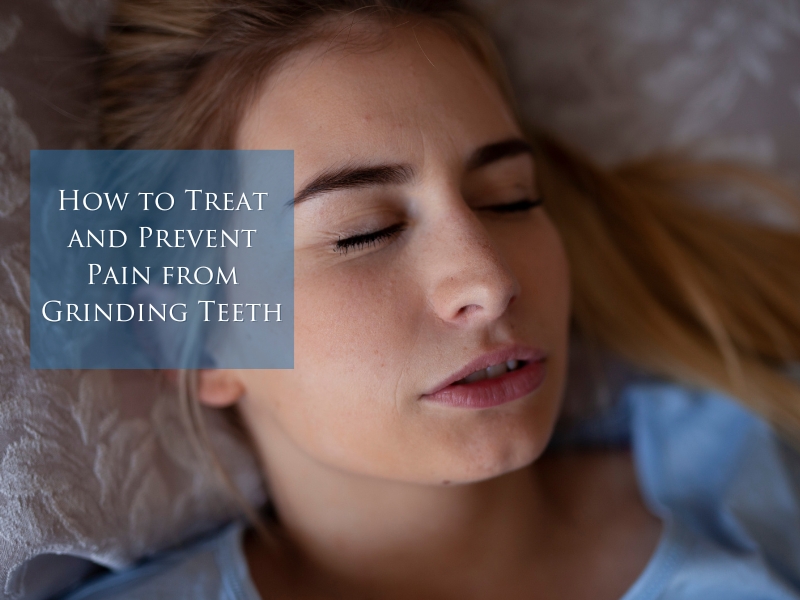How to Treat and Prevent Pain from Grinding Teeth

Teeth grinding, or bruxism is a common problem that affects millions of people worldwide. It’s often an unconscious habit, typically occurring during sleep, but it can also happen while awake, especially during stress or intense concentration. Unfortunately, this habit can lead to persistent pain in your teeth and other areas of your body, like the jaw, head, and neck. If left untreated, grinding your teeth can lead to more serious dental issues that require extensive intervention.
In this blog, we’ll delve into the causes of pain from teeth grinding, explore practical ways to treat and prevent it and explain how you can protect your oral health in the long term. Whether you’ve been told you grind your teeth at night or have been feeling discomfort for reasons you can’t pinpoint, this article will help you understand the root causes and offer solutions to manage the condition.
What Causes Pain from Grinding Teeth?
Teeth grinding can be triggered by a variety of factors, some of which may be physical, while others could be emotional or lifestyle-related. It’s important to know that the pain you feel from grinding isn’t just about your teeth—it’s also about the surrounding muscles, joints, and ligaments in your jaw, neck, and face.
Here are some common causes:
- Stress and Anxiety: Stress is one of the most significant contributors to teeth grinding. Your body may manifest this tension when you’re tense by clenching or grinding your teeth. People often aren’t aware that they’re doing this, especially at night, so that it can go unnoticed for a long time.
- Sleep Disorders: Teeth grinding is often associated with sleep conditions such as obstructive sleep apnea or snoring. People with these issues are more likely to grind their teeth as their body struggles to maintain proper breathing during sleep.
- Improper Bite: An abnormal bite or misalignment of the teeth can cause grinding. When your teeth don’t fit together properly, your jaw compensates by moving in ways it shouldn’t, which can lead to grinding and pain.
- Medications and Substance Use: Certain medications, especially antidepressants or stimulants, have been linked to teeth grinding. Additionally, the use of alcohol, caffeine, or recreational drugs can exacerbate the problem by overstimulating the nervous system.
- Age and Lifestyle: Teeth grinding is often seen in children but usually goes away as they grow. However, in adults, lifestyle factors like smoking, alcohol consumption, and poor sleeping habits can make the condition worse.
Understanding the causes of your grinding is key to identifying effective treatment options. Knowing why it happens can help you target the underlying issue and take steps toward relief.
What Are the Symptoms of Teeth Grinding?
Many people don’t even realize they grind their teeth until they start feeling pain. The symptoms can be subtle at first, but they become more pronounced as the habit continues. Some of the most common signs and symptoms of teeth grinding include:
- Dental Pain and Sensitivity: The most obvious symptom is pain or sensitivity in your teeth. You may notice discomfort while eating, especially when consuming hot or cold foods.
- Jaw Pain or Stiffness: Waking up with a sore jaw is a clear sign of nighttime grinding. The constant pressure on your jaw muscles from clenching can lead to tightness and soreness, sometimes even extending to your neck and shoulders.
- Headaches: Frequent headaches, particularly in the morning, are a common sign of bruxism. The tension in your jaw radiates upwards, causing stress and pressure in your temples and forehead.
- Tooth Wear: Over time, grinding can wear down your tooth enamel, flattening or chipping your teeth. This erosion can increase the risk of cavities and even change the shape of your teeth.
- Sleep Disturbances: Bruxism often disrupts your sleep, and you may wake up multiple times during the night without realizing it. Your partner may also hear you grinding your teeth.
If you’re experiencing any of these symptoms, it’s essential to seek treatment before the damage becomes irreversible. Early intervention can help you avoid more significant dental problems down the road.
How to Treat Pain from Grinding Teeth
There are several effective ways to treat the pain caused by teeth grinding, ranging from at-home remedies to professional dental interventions. Depending on the severity of your condition, you may need a combination of treatments to find relief. Here are some of the most common options:
- Mouthguards or Splints: One of the most effective ways to protect your teeth from the damage caused by grinding is by wearing a custom-fitted mouthguard. Your dentist can create one specifically for your bite, which will cushion your teeth and prevent them from grinding against each other.
- Stress Management: Since stress and anxiety are significant contributors to teeth grinding, practicing stress-reducing techniques can make a big difference. Yoga, meditation, deep-breathing exercises, and therapy can help you manage tension and reduce your nighttime grinding.
- Medications: In some cases, your dentist or doctor may recommend muscle relaxants or anti-anxiety medications to help you relax before bed. However, these should be seen as short-term solutions and not as the primary treatment method.
- Behavioral Therapy: Cognitive-behavioral therapy (CBT) can help address the root causes of bruxism, particularly if it’s linked to stress or anxiety. By working with a therapist, you can learn new coping mechanisms and strategies to alleviate the emotional triggers that cause grinding.
- Botox Injections: Botox is an emerging treatment for severe teeth grinding. By injecting Botox into the jaw muscles, you can reduce the tension and frequency of grinding. This treatment is typically recommended for those who have not found relief through other methods.
- Dental Treatments: If your teeth have been damaged by grinding, your dentist may recommend restorative procedures, such as crowns, to repair the damage. These treatments can improve the function of your teeth and reduce future wear.
How to Prevent Grinding Teeth and the Associated Pain
Preventing teeth grinding is just as important as treating it. Making a few lifestyle changes and adopting good dental habits can significantly reduce the risk of grinding and its painful effects.
- Improve Your Sleep Hygiene: Maintaining a regular sleep schedule and creating a relaxing bedtime routine can reduce the likelihood of nighttime grinding. Avoid caffeine, alcohol, and electronic devices before bed, as these can disrupt your sleep patterns.
- Jaw Exercises: Simple exercises can help strengthen your jaw muscles and alleviate tension. Your dentist or physical therapist can guide you through specific stretches that relax your jaw and prevent it from clenching.
- Limit Alcohol and Caffeine: Both alcohol and caffeine stimulate the nervous system and can increase the likelihood of grinding. Reducing or eliminating these substances can make a noticeable difference.
- Monitor Your Stress Levels: Managing stress is key to preventing teeth grinding. Regular exercise, mindfulness techniques, and taking breaks during the day can help keep stress in check and reduce the frequency of grinding episodes.
- Regular Dental Check-ups: Regular visits to your dentist allow them to monitor your oral health and catch any early signs of grinding. They can also provide you with a custom mouthguard or other preventative treatments if necessary.
By making these small adjustments to your daily routine, you can effectively reduce your risk of grinding and avoid the pain and damage associated with it.
What Should You Do If You Think You’re Grinding Your Teeth?
If you suspect that you’re grinding your teeth, the best course of action is to see a dentist. They can evaluate your symptoms, check for signs of wear and tear, and recommend an appropriate treatment plan. Early intervention is crucial, as it can prevent further damage and help you manage any associated pain.
If left untreated, bruxism can lead to more severe dental issues, including cracked teeth, tooth loss, and temporomandibular joint (TMJ) disorders. Don’t wait until the damage is done—schedule a visit to your dentist if you’re experiencing any symptoms.
Teeth grinding can lead to pain and dental damage, but it’s manageable with the right care. If you’re experiencing symptoms like jaw pain or worn teeth, don’t wait—early treatment is key. Schedule a visit with your dentist today and take control of your oral health before the issue worsens!

